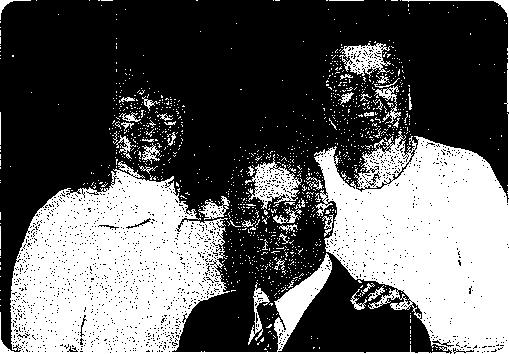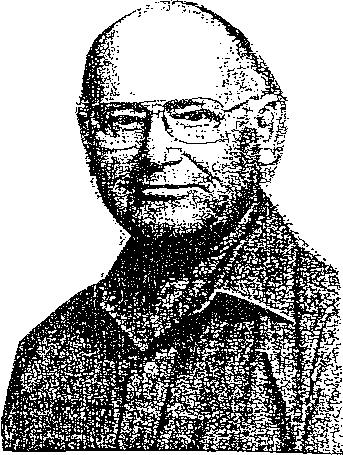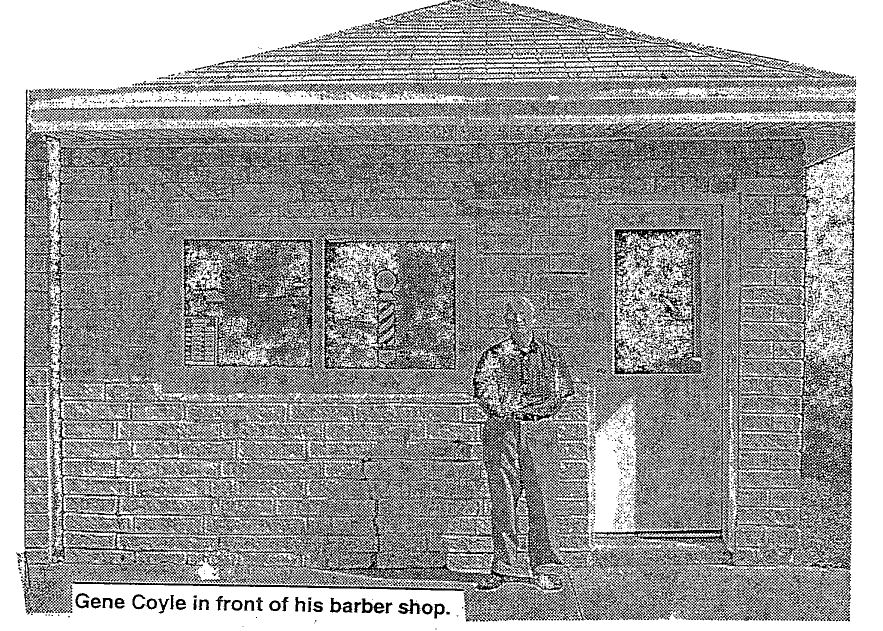GENE COYLE FAMILY
Gene Coyle was one of what Dr. Story estimated as 5,000 babies he had delivered in Osceola, Iowa. Gene was born in 1947, to Cliff and Ruth Coyle, grew up and was educated in Clarke Community Schools, graduating from high school in 1965. During his school years, the family lived under the tension of Cliff's military service.
In April 1941, Cliff volunteered for a year of training and became a member of the 133rd Infantry Regiment, 34th "Red Bull" Division. He was standing at the gate to catch a bus which would take him to Alexandria, Louisiana, where he would catch a train to return home, when news of "the attack" came down from above.
|
|

|
|
In those days the "attack" would have been as significant as now when 9/11 is all that needs to be said to conjure up recollections of the tragedy. At that time it referred to December 7, 1941, when the attack was made on Pearl Harbor. "They cancelled our leaves and I didn't get home until July of 1945." The first elements of the 133rd sailed for Ireland in January 1942.
Cliff served for 52 months, 42 of which were spent in Ireland, Africa, and Italy. The Red Bull Division was the first American Division in the European Theater. By the end of the war, it had the most front-line time of any American unit - over 500 days of combat. A revealing indication of what they endured was Cliff's statement in later years, "There are no atheists in foxholes."
Cliff kept his family informed as well as he could, and his father, Ode Coyle, took the letters to editors of the Osceola Sentinel-Tribune, J. M. Grimes and F.L. Abbott who printed them. Following Pearl Harbor, the division moved to Fort Dix, New Jersey. "Fort Dix was probably one of the coldest spots I've ever been in all my life. I had guard duty along that ocean front — never could get enough clothes on."
A letter was received from "somewhere in Ireland," which included clippings about the American troops and camp life. An officer was quoted, "The morale is just as high as it could be." When he was asked if the men were "anxious to have a crack at Hitler, he answered, 'Hell, yes. These boys want to get this thing over so they can get back home.'"
One dated January 14, 1943, was about their unforgettable Christmas in North Africa. They were on the high seas at the time. The days were warm and the nights ice cold. They picked oranges and tangerines from the trees. The French people were friendly, inviting the servicemen into their homes.
A transition came about, reported in the paper of April 8, 1943: "This is indeed a new army!" The wide gulf between officers and men apparently was gone, evidenced in a letter received by Ode Coyle from Lt. Col. Bruno G. Marchi, commander of the battalion in which Cliff was serving: "Please don't be too surprised on receiving this letter. I felt you would like something about your son. I know the opening of the African front probably has worried you. Please don't worry. He is well and getting along fine. Talked to him today and he is as happy as
any of us can be when away from home. The food is good and the billets are warm and dry. The men have plenty of recreation and we try to keep them as happy as possible. I wanted to send you this letter before Christmas but I knew we would be on the move and I did want to wait until I was sure where we would be. I hope this will find you and yours well and happy. I promise to do my best to bring all the boys home again. Sincerely," (signed Col. Marchi.)
Cliff had written, "We didn't worry too much about what was going on around the world — we worried about ourselves. We worried all the time about whether our time had run out. We didn't have a lot of time for the world's prejudices, either - units of distinction made up of Japanese-American volunteers were attached to the 34th. I'd run into them when I was carrying messages. They were wonderful combat people. I reckon they were trying to make a name for themselves. They couldn't have been beat...They were fighting on our side, and they were doing a good job."
|
|

|
|
There was an article about the Fifth Army in Italy that mentions, in addition to Cliff, Sgt. Donald W. Rinner of Murray and Cpl. Warnie B. Neal of New Virginia. At that time the Red Bull Division had "piled up more hours in actual combat than many American Divisions have time overseas. The veteran Fifth Army regiment first blazed its guns at a cocky enemy in the Boney mountain ranges of Tunisia and defeated the Krauts in the famous battle for Hill 609. Backed from Tunisia to the Arno, the defeated-written faces of retreating Gelman troops were still haunted by the Red Bulls who have gored the enemy at Cassino, Anzio, and in crushing drives above Rome.
"With a record of having taken every objective assigned to it, the 133rd has become one of the most decorated units in the Mediterranean Theater. Scattered among the fighting infantrymen of the unit are two Congressional Medals of Honor, 19 Distinguished Service Crosses, 117 Silver Stars for gallantry in action and more than 1500 Purple Heart awards."
In a V-mail letter to his parents, Cliff wrote, "I guess the news correspondent must have sent the award of the combat medal to the local newspaper. I would never have sent it. It didn't mean that much to us. It gives us $10 a month extra, which is the only good thing about it. The boy who went on furlough with me to London was killed in action. I think I wrote you something about that so won't say any more. We aren't exactly supposed to mention it "
Cliff wrote about a four-day furlough in Rome. "We stayed in a school building built by Mussolini for the training of his young Fascists. Of course it is being used now for a much better purpose. There are numerous statues, three large stadiums, and one of the finest swimming pools I have ever seen anywhere in the world. They were all for our access. The Army had movies in each building and the Red Cross was quite helpful in many ways.
"The first day I was there I started out to see some of the historical places of interest. I was standing on a street corner looking at a map when a gentleman stopped and asked me in English if he could help me. I told him not in particular. Then he said his wife was born in Tarkio, Missouri and would like to talk to me. He asked me to come to his home that afternoon. I had nothing to lose, so dropped by. He is a physician and had practiced in the States. We had a very interesting talk. His two young sons went with me to show me the sights. They were quite well posted and did a lot of explaining." He went on to describe the various places, such as the sights around the Vatican, the Palace of Justice, monument of Victor Emanuel II, the Coliseum, Catacombs, and many others.
There were other less pleasant aspects of Italy: "I imagine I walked the length of Italy ten times. There was plenty sand in Africa and plenty of mud in Italy. When the snow melted in Italy and ran off, it washed the mud down and covered up tanks — a mule couldn't get through it." Dad told after he came home that most of the time he went by himself and his messenger duties took him right up to the front lines. A high-ranking officer offered to walk with him and Cliff warned him that even if he had to walk in mud, he must walk in the ditch beside the railroad tracks and not on them. The man refused and was shot by a sniper.
Harris Faher, from Traer, Iowa and Dad became buddies. They were often in fox-holes together with bullets whizzing over their heads. They realized how close death might be and made a pact that if one survived and the other did not, the survivor would go to see the parents of his friend. Harris was killed, and after Dad and Mom were married they went to see Harris' mother. She was so pleased to see them. She brought out Harris' billfold. Whatever it was soaked with, it smelled of death.
In the collection of letters and clippings is one accompanying the award of the bronze star medal. It says, "For meritorious service in combat from 13 April 1944, to July 1, 1944. During this period Pfc. Coyle demonstrated outstanding services as company messenger for a rifle company. Constantly displaying a remarkable degree of ingenuity, alertness and fortitude, Pfc. Coyle worked tirelessly to perform the countless dangerous and important missions assigned to him. The fearlessness, dependability, and devotion to duty displayed by Pfc. Coyle contributed materially to the successes of the Battalion." Dad was 28 years old in July 1945, when he was discharged. Our family breathed a huge sigh of relief, and our lives resumed.

|
|
I had known I wanted to follow Grandfather Ode's profession of barbering, and in October of the year I graduated from High School, I enrolled in Iowa Barber College in Des Moines. It was on 3rd and Walnut across from the Federal Building, now the location of the Civic Center. Tuition for barber college was $540; the course of study was nine months plus 1 years apprenticeship. My first job was in Iowa Falls for six months.
We worked long hours in those days. There were 3 of us, "3 chairs," and we worked from 8:00 a.m. until 10:00 at night, or as late as midnight, if there were customers. We performed lots of services in |
|
addition to hair cutting. We shampooed and shaved, for which we used straight-edge razors. The invention of the safety and electric razors retired our straight-edge tool, although I still use it around the neckline.
When men began shaving, our business was affected in various ways. As the need tapered off, barbers generally gave up shaving. I quit about five years ago. There is a technique to using straight-edge razors, and with less practice, the technique is lost. Shaving was time-consuming and when there was less, fewer barbers were needed. I am working alone, in my shop 3 1/2 days a week, but two days a month I spend about half of one shampooing and cutting hair of shut-ins in their homes, the hospital, Casual Living, and Southern Hills Care Center, Many of the residents were my customers. I enjoy them and I know keeping their hair trimmed gives them a sense of well-being and self-assurance.
I met Sherry while I was working in Iowa Falls: Sherry was born in Muscatine, Iowa. Her father passed away while she was in school, and her mother remarried. Sherry's stepfather was a depot agent for the Rock Island Railroad and they moved often. Sherry graduated from Sibley High School in 1966.
Sherry and I were married in 1968, and our next move was to Waukee, Iowa. From there we moved back to my hometown, Osceola, in 1973, and she worked at Furnas Electric for 25 years and HyVee before we retiring. We have a daughter Christine.
Of course I have seen many changes through the years. When I started, hair cuts were 75¢ and I think a shave was 50¢. I seem to recall a jingle "shave and a hair-cut, six bits.” In the course of my years in the business, men have gone from long hair to short hair and back to long.
Now haircuts are $8, whether the hair is long, short, or a "Butch" style. In olden days, a man wouldn't consider patronizing a beauty salon, which happens frequently now.
What hasn't changed is the conversation, which is usually lively. There is much discussion of the latest news, politics from time to time, and while it sometimes is heated, it is always in good humor and no one leaves angry.
"I am beginning to think toward retirement. The years of standing and raising my arms are taking their toll and my shoulders and legs bother a little. I have a problem with high blood pressure, which may be a family trait. I have no regrets about my choice of career. I've had a lot of loyal customers and haven't really thought of it as work. It has been a pleasure; but I will not mind being home, which both Sherry and I enjoy..
"I was so glad when Dale Short came to ask me about this type of career. He and I are the only barbers in Osceola and his practice will mean a barber will be available if or when I decide enough is enough.
September, 2011: Gene closed his shop and discontinued his barbering after 47 years.
Return to main page for Recipes for Living 2011 by Fern Underwood
Last Revised January 31, 2015



